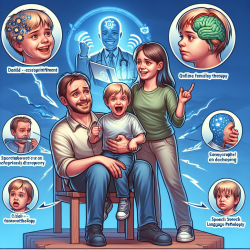Family interaction plays a pivotal role in the overall well-being of each member of a family unit. For families caring for children with neurodevelopmental disorders (NDDs), these interactions can become particularly strained, often resulting in high levels of expressed emotion (EE). According to a recent study titled "Expressed Emotion in Families of Children with Neurodevelopmental Disorders: A Mixed-Method Approach," there are significant associations between EE, caregivers' stress, and the self-sufficiency of the child.
Understanding these associations can help practitioners improve their interventions and support strategies for families. Here are some key insights from the research:
Key Findings
- Expressed Emotion and Caregivers' Stress: The study found a significant association between high EE and increased stress levels in caregivers. Caregivers exhibiting high levels of criticism, hostility, or emotional over-involvement reported higher stress levels.
- Expressed Emotion and Self-Sufficiency: There is a notable correlation between EE and the self-sufficiency of children with NDDs. Higher EE is often associated with lower self-sufficiency in activities of daily living (ADL) in children.
- Caregivers' Stress and Self-Sufficiency: The study also revealed a negative correlation between caregivers' stress and the child's self-sufficiency. As children's self-sufficiency increases, caregivers' stress tends to decrease.
Practical Implications for Practitioners
These findings offer valuable insights for practitioners working with families of children with NDDs. Here are some practical steps to consider:
- Assess Expressed Emotion: Use tools like the Five-Minute Speech Sample (FMSS) to assess EE within the family. Identifying high EE can help in tailoring interventions that address specific emotional dynamics.
- Focus on Reducing Caregivers' Stress: Implement stress-reduction strategies for caregivers, such as counseling, support groups, and relaxation techniques. Reducing stress can help in lowering EE and improving the overall family environment.
- Promote Self-Sufficiency in Children: Encourage activities that foster independence in children. Occupational and speech therapy can be beneficial in enhancing self-sufficiency, which in turn can reduce caregivers' stress.
- Address Future Concerns: Provide resources and counseling to help caregivers manage anxieties about their child's future. This can alleviate some of the negative EE and improve family dynamics.
Encouraging Further Research
While this study provides valuable insights, further research is essential to deepen our understanding of EE in families of children with NDDs. Practitioners are encouraged to explore additional factors that may influence EE and develop comprehensive intervention strategies.
To read the original research paper, please follow this link: Expressed Emotion in Families of Children with Neurodevelopmental Disorders: A Mixed-Method Approach










